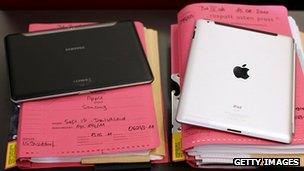Apple blocks Google Motorola's sensor patent challenge
- Published

Apple uses a proximity sensor to detect when its iPhone is close to a face to avoid accidental actions
Google has failed in its latest attempt to convince a US trade agency that Apple has infringed its intellectual property.
The case centred on a claim the iPhone maker should have licensed a feature that lets its handsets ignore touches when held close to users' heads.
Google had acquired the contested patent as part of its $12.5bn (£8.2bn) takeover of Motorola Mobility.
Apple could have faced an import ban on its mobiles had it lost.
Although Apple is based in the US, it outsources production of its mobiles to factories in China and Brazil making them vulnerable to such a challenge.
Dropped claims
Motorola accused Apple of infringing six of its inventions when it launched the case in October 2010, 10 months before Google announced it was buying the Motorola division.
Since then, the US's International Trade Commission has ruled three of the complaints were illegitimate and Motorola willingly dropped another two.
The Google-owned division briefly pursued a further seven claims against Apple in a separate complaint filed with the ITC in August 2012, but it dropped the case without explanation two months later.
The ITC dismissed the final outstanding claim on Tuesday after accepting Apple's argument that the sensor technology used to touch-protect its phones was "obvious" bearing in mind other earlier efforts by tech firms to tackle the problem of accidental dialling.
Although the latest ruling brings to an end the firms' legal clashes at the ITC, Google has the right to challenge the agency's judgement at the US Court of Appeals for the Federal Circuit.
"We're disappointed with this outcome and are evaluating our options," said a spokesman for the Android software developer.
Apple declined to comment.
Overvalued patents?
Google has always said the Motorola acquisition was more about the value of the firm's patents rather than its desire to get into the mobile hardware business.
"Motorola Mobility's patent portfolio will help protect the Android ecosystem," it said in a press release, external.
"Android, which is open-source software, is vital to competition in the mobile device space, ensuring hardware manufacturers, mobile phone carriers, applications developers and consumers all have choice."

Apple has pursued claims against Samsung, HTC and other Android-device makers
Since completing the deal, Google has pursued cases against Apple and Microsoft in the European and US courts.
Success would strengthen its negotiating position to challenge its rivals' own infringement claims against individual manufacturers that make Android devices.
Google's most notable success was forcing Apple to suspend its push email service in Germany, but when it subsequently attempted to challenge Microsoft's use of the same message-synchronisation technology, a UK judge ruled the patent at the heart of the case was invalid.
One legal expert suggested Google's legal tussles demonstrated how difficult it was to value its acquired assets.
"Patents are hugely difficult things - they have to be novel and inventive over what other people have done before," Vicki Salmon, chair of the UK's Chartered Institute of Patent Attorneys' litigation committee, told the BBC.
"We are finding in Europe that a lot of the patents granted in the information, technology and communications space prove not to be valid when tested in court.
"When we look at some of the values that the patent portfolios went for in recent years, they were just extraordinary. Were they really worth that much? I'm not too sure.
"Although we are seeing the public fights and tend to notice the big wins and losses, we may not publically see the real value... there may be other licensing deals happening in private which we don't know about and which may be returning some value on those portfolios."
- Published7 March 2013
- Published3 April 2012
- Published8 March 2012